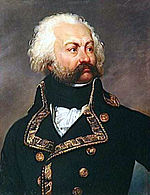Adam Philippe, Comte de Custine, Date of Birth, Place of Birth, Date of Death
TweetAdam Philippe, Comte de Custine
French generalAbout Adam Philippe, Comte de Custine
- Adam Philippe, Comte de Custine (4 February 1740 – 28 August 1793) was a French general.
- As a young officer in the Bourbon Royal army, he served in the Seven Years' War.
- In the American Revolutionary War he joined Rochambeau's Expédition Particulière (Special Expedition) supporting the American colonists.
- Following the successful Virginia campaign and the Battle of Yorktown, he returned to France and rejoined his unit in the Royal Army. When the French Revolution began he was elected to the Estates-General and served in the subsequent National Constituent Assembly as a representative from Metz.
- He supported some of the August Decrees, but also supported, generally, royal prerogative and the rights of the French émigrés.
- At the dissolution of the Assembly in 1791, he rejoined the army as a lieutenant general and the following year replaced Nicolas Luckner as commander-in-chief of the Army of the Vosges.
- In 1792, he successfully led campaigns in the middle and upper Rhine regions, taking Speyer and Mainz and breaching the Wissembourg lines.
- Following Charles François Dumouriez's apparent treason, the Committee of Public Safety investigated Custine, but a vigorous defense mounted by the Revolutionary lawyer Robespierre resulted in his acquittal. Upon return to active command, he found the army had lost most of its officer corps and experienced troops, and in 1793, following a series of reversals in the spring, the French lost control of much of the territory they had acquired the year before.
- Ordered to take command of the Army of the North, Custine sought first to solidify French control of the important crossings of the Rhine by Mainz.
- However, when he failed to relieve the besieged fortress of Condé the following year, he was recalled to Paris.
- After Condé, Mainz and Speyer had all been lost, he was arrested.
- He was prosecuted in a lengthy trial before the Committee on Public Safety's Revolutionary Tribunal by Antoine Quentin Fouquier-Tinville, and Jacques Hébert continued to attack Custine through his publication Le Père Duchesne.
- Custine was found guilty of treason by a majority vote of the Tribunal on 27 August, and guillotined the following day. His son was also executed a few months later, and his daughter-in-law suffered for several months in prison before she was released in the summer of 1794.
- She managed to recover some of the family property and emigrated to Germany, and later, Switzerland, with her son, Astolphe-Louis-Léonor, who became a well-known travel writer.
- The fate of the family is representative of the fates of many of the minor aristocracy in France, especially those in the military and diplomatic corps, whose reputations the Montagnards tarnished in the Reign of Terror.
Read more at Wikipedia
See Also
- Famous People's Birthdays on 04 February, France
- Famous People's Birthdays in February, France
- Famous military personnel's Birthdays on 04 February, France
- Famous military personnel's Birthdays in February, France
- Famous politician's Birthdays on 04 February, France
- Famous politician's Birthdays in February, France
- Famous military officer's Birthdays on 04 February, France
- Famous military officer's Birthdays in February, France


 Date of Birth:
Date of Birth:  Place of Birth: Metz, Grand Est, France
Place of Birth: Metz, Grand Est, France
